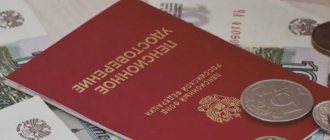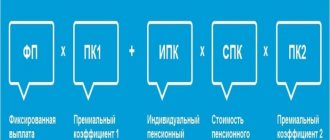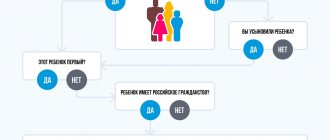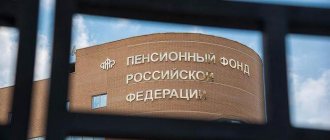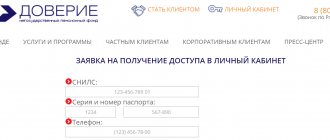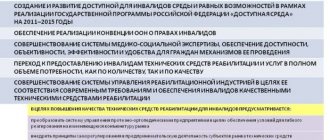The employer contributes 22% to the pension from each salary
If the employee’s salary is below RUB 1,021,000 per year, then every month the employer contributes 22% of the salary to the pension fund. From the amount exceeding 1,021,000 ₽, 10% is deducted. If you earn 10 thousand rubles a month, 2200 rubles go to the pension fund every month, if 50 thousand - 11 thousand rubles, if 150 thousand rubles - up to 33 thousand rubles per month. For a year, impressive amounts are obtained.
| Salary before taxes, ₽ | Contributions to the pension fund for the year, ₽ |
| 10 000 | 26 400 |
| 30 000 | 79 200 |
| 50 000 | 132 000 |
| 100 000 | 242 520 |
| 150 000 | 302 520 |
The circle of persons covered by labor and state pensions
The range of subjects entitled to labor pensions is determined by general provisions, according to which the following have the right to a pension:
- citizens of the Russian Federation insured in accordance with the Law on Compulsory Pension Insurance, subject to their compliance with the conditions provided for by the Law on Labor Pensions;
- disabled family members of insured persons;
- foreign citizens and stateless persons permanently residing in the Russian Federation who have the right to a labor pension on an equal basis with citizens of the Russian Federation (except for cases established by federal law or an international treaty of the Russian Federation).
The concept of an insured person is disclosed in two laws - the Law on Compulsory Pension Insurance and the Law on Personalized Accounting in the Compulsory Pension Insurance System.
According to the Law on Compulsory Pension Insurance, insured persons are persons who are covered by compulsory pension insurance. These include:
- citizens of the Russian Federation;
- foreign citizens or stateless persons permanently or temporarily residing in the territory of the Russian Federation;
- foreign citizens or stateless persons temporarily staying in the territory of the Russian Federation who have entered into an employment contract for an indefinite period or a fixed-term employment contract for a period of at least six months (with the exception of highly qualified specialists in accordance with Federal Law of July 25, 2002 No. 115-FZ " On the legal status of foreign citizens in the Russian Federation").
Among the citizens of the Russian Federation, these foreign citizens and stateless persons, the insured persons are:
- working under an employment contract or under a civil law contract, the subject of which is the performance of work and the provision of services, as well as under a copyright and licensing agreement;
- those who provide themselves with work (individual entrepreneurs, lawyers, notaries engaged in private practice);
- who are members of peasant (farm) households;
- working outside the territory of the Russian Federation in case of payment of insurance premiums in accordance with Art. 29 of the Law on Compulsory Pension Insurance (unless otherwise provided by an international treaty of the Russian Federation);
- who are members of family (tribal) communities of small peoples of the North, Siberia and the Far East of the Russian Federation, engaged in traditional economic sectors;
- clergy;
- other categories of citizens whose relations under compulsory pension insurance arise in accordance with the Law on Compulsory Pension Insurance (for example, individuals who have entered into legal relations under compulsory pension insurance: a) for the purpose of paying insurance premiums for another individual for whom it is not carried out payment of insurance premiums by the policyholder; b) for the purpose of paying insurance premiums for oneself, if this individual permanently or temporarily resides in the territory of the Russian Federation and is not covered by compulsory pension insurance).
The Law on Personalized Accounting contains a different wording that reveals the concept in question: insured persons are persons who are subject to compulsory pension insurance, including persons employed in a workplace with special (difficult and harmful) working conditions, for whom insurance contributions are paid to the Pension Fund of the Russian Federation .
Taken together, both definitions more fully define the concept of “insured persons”.
The Law on State Pension Security defines the circle of subjects in a different way - by establishing a list of specific categories of citizens whose pension provision is carried out in accordance with the norms of this Law.
The following are entitled to a state pension:
- federal government civil servants;
- military personnel;
- participants of the Great Patriotic War;
- citizens awarded the badge “Resident of besieged Leningrad”;
- citizens affected by radiation or man-made disasters;
- citizens from among the astronauts;
- citizens from among the flight test personnel;
- disabled citizens.
Family members of these citizens have the right to a state pension in cases provided for by law.
The legal regulation of pension provision for military personnel is complicated by the presence of relevant provisions in two laws: the Law on State Pension Provision and the Law on Pension Provision for Military Personnel. The differentiation of legal regulation is carried out depending on the status of the military personnel. According to the provisions of the Law on State Pension Provision, pension provision is provided for military personnel who served in conscription as soldiers, sailors, sergeants and foremen (conscripts). According to the same Law, pension provision is provided for family members of deceased (deceased) military conscripts.
In addition, the provisions of this Law apply to foreign citizens who served in the Armed Forces of the Russian Federation, other troops, military formations and bodies, and members of their families.
Pension provision for military personnel who served under contract, other categories of employees equal to them in terms of pension provision and members of their families is carried out in accordance with the provisions of the Law on Pension Provision for Military Personnel. The Law provides a detailed list of persons covered by it who have served in the Armed Forces of the Russian Federation, other troops, military formations and bodies that provide for military and other equivalent service.
The difference between the two indicated categories of military personnel is that in the first case, military service is carried out in fulfillment of the constitutional obligation to defend the Fatherland (military personnel undergoing military service upon conscription); and in the second, military service is a professional activity (military personnel performing military service under a contract).
The Law on State Pension Security, defining the basic concepts used in the Law, details and specifies the above categories of citizens (federal civil servants, military personnel, participants in the Great Patriotic War, disabled citizens).
The category of citizens who suffered as a result of radiation or man-made disasters includes citizens who suffered as a result of the disaster at the Chernobyl nuclear power plant.
This is a fairly detailed category of citizens in ten groups. Differentiation by groups is associated with the health status of citizens exposed to radiation, with different stages of work to eliminate the consequences of the disaster at the Chernobyl nuclear power plant, work or residence in areas exposed to radiation contamination. In matters of pension provision for this category of citizens, the Law on State Pension Provision is closely related to the Law on Social Protection of Citizens Affected by the Chernobyl Disaster.
The assignment of each social pension is associated with certain categories of disabled citizens specified in the Law on State Pensions.
Moreover, the circle of subjects receiving social pensions is quite limited. Disabled persons specified in the Law have the right to a social pension only if they permanently reside in the Russian Federation. These individuals include:
- disabled people of groups I, II and III, including those disabled since childhood;
- disabled children;
- children under the age of 18, as well as over this age, studying full-time in educational institutions of all types and types, regardless of their organizational and legal form, with the exception of educational institutions of additional education, until they complete such training, but not longer than they have reached the age of 23, have lost one or both parents, and are children of a deceased single mother;
- citizens from among the indigenous peoples of the North who have reached the ages of 55 and 50 years (men and women, respectively);
- citizens who have reached the ages of 65 and 60 years (men and women, respectively).
Some people may retire early
For example, rescuers, regardless of gender, retire at the age of 40. Women working in hot shops can retire at 45, and men at 50. Loggers, crew members on ships, drivers of buses, trolleybuses, trams, and pilots have the opportunity to stop working earlier than others: women retire at 50, and men at 55.
At age 50, women who have given birth to five or more children and raised them until the age of 8 can retire. There is also a benefit for residents of the Far North: women there become pensioners at 45, and men become pensioners at 50.
The old age pension consists of two parts
The insurance part (16% of the salary is deducted for it) is calculated based on the points assigned to citizens for each year of work, and a fixed amount is added to their cost - in 2018 it is 4,893 rubles. To receive a pension, you must fulfill the conditions for the number of accumulated points and years of experience: now - 13.8 points and 9 years, by 2025 these figures will reach 30 points and 15 years.
The funded part (6%) of the pension is invested by a pension fund that you can choose. It has been frozen since 2014; the freeze has currently been extended until 2020.
https://www.sravni.ru/text/2018/6/19/kak-nakopit-na-pensiju-esli-tebe-30-let/
Changes in 2020
In the Russian Federation, they provide many different types of social security (for the loss of a breadwinner, for displaced persons) and old-age pension is only one of the varieties.
Every year the Government makes many changes to increase the size of the pension.
In 2020, payment indexation was carried out in January and April, and another one is planned for August.
Pensions such as the old-age pension, as well as various social supplements (for disabled people, military personnel, etc.) have already been recalculated. The indexation rate in this case varies between 3.7% and 4.1%. Many have already received increased pensions in February or May 2020.
The most important changes affected payments for working pensioners.
Indexation has not been carried out for them since 2020. This is due to the receipt of wages by such citizens, which are indexed annually.
Recalculation of pensions for working persons does not depend on employment only when receiving social pensions.
For other pensioners, their payments remained at the 2020 level. However, already in 2020, the State Duma adopted for consideration a bill on the resumption of indexation for this category of pensioners.
How much is the disability pension for group 1? When will the pensions of military pensioners be increased? Find out here.
When will the survivor pension increase? Read on.
Therefore, employed senior citizens can count on increased payments. True, it is too early to talk about timing. According to rumors, the recalculation may be carried out as early as August, but one should not hope for this.
Most likely, this procedure will be carried out no earlier than 2020.
Pension payments in the Russian Federation are provided according to the established procedure.
A citizen just needs to submit an application and after 10 days the required amount will begin to be credited. Money is legally paid monthly in the form of a fixed amount, which is recalculated annually.
The funded part of the pension can be transferred through State Services
The funded part of the pension is insured by the state, like bank deposits - if something happens to the pension fund, the money will not be lost.
If you do not want your money to be managed by a state pension fund, you can transfer the funded part of your pension to a non-state one. This can only be done once a year, and you need to do it before December 31st. To transfer a pension, it is enough to write an application through the State Services website.
Be careful: if your pension has been in the current fund for less than five years, then upon transfer you will lose accrued income.
Pensions can only be received on cards of the Mir payment system.
Pensioners are offered the following options for receiving a pension:
- at the Russian Post office;
- with home delivery;
- non-cash transfer to a card of the Mir payment system.
You can choose any bank that offers cards of the Russian system, but you cannot receive a pension using Visa or MasterCard.
https://www.sravni.ru/text/2018/4/24/12-debetovykh-kart-dlja-pensionerov/
If you are not satisfied with the Mir card, you can open any other one - but you will have to transfer money from your pension card there every month.
In what case does it stop?
Payment of pensions is carried out on the basis of the Federal Law “On Insurance Pensions”. Article 25 of this normative act contains a list of grounds on which the provision of security may be terminated.
These reasons are:
- death of the recipient;
- the pensioner was declared missing;
- the payment was suspended more than six months ago, but the recipient did not contact the Pension Fund;
- the pensioner independently refused to receive funds;
- providing false documents.
In some cases, the pensioner may be able to obtain the resumption of payments.
But if he carried out fraudulent actions to obtain a pension, he will be held accountable.

